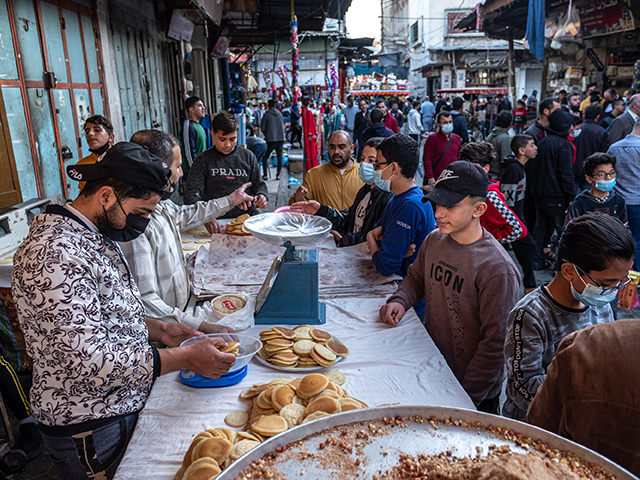Muslims around the world are beginning to celebrate the second Ramadan holy month of the pandemic era, once again seeking to navigate different lockdowns and social distancing requirements in various countries, plus economic travails and factional conflicts exacerbated by the coronavirus.
Ramadan begins on different days according to religious differences and regional lunar sightings, sometimes beginning on different days for various groups within the same country, as in Iraq. Some Sunni Muslim observances began on April 12 this year, while Shiites generally do not begin until April 14.
Iraq is currently under partial coronavirus lockdowns, with exceptions for mosques and some commercial operations. Last year Ramadan was observed under full lockdown, with minimal exceptions for religious activities. Iraqi health officials have prohibited charity banquets – a traditional feature of Ramadan, often held in the style of an open-air block party – but will allow food drives for poor families.
Ramadan observance involves daily fasting from dawn until dusk, beginning after a dawn meal called Sehri and ending with an evening meal called Iftar. The precise timing of these meals is determined by religious authorities.
Dubai issued instructions that the morning and evening meals must be attended only by family members living in the same household, to reduce the risk of coronavirus transmission.
Malaysia, on the other hand, announced extended operating hours for restaurants so they could accommodate the dawn meal, and will permit buffets and all-night dining throughout the holiday.
India’s Kashmir region announced steep fines for violations of social distancing protocols during Ramadan, including at mosques. Local officials were instructed to ensure mosques have an adequate supply of masks for extended Ramadan services.
Ramadan began in Turkey soon after tighter coronavirus restrictions were imposed, making the 2021 holiday season very similar to 2020. The Turkish government banned mass public dinners and even issued specific instructions for how traditional pide bread could be prepared to prevent crowds from gathering outside bakeries at sunset. Turkish restaurants are only allowed to serve food by home delivery, as a strict coronavirus curfew has been imposed. Mosques are closed and group prayers have been forbidden.
Pakistani Prime Minister Imran Khan instructed citizens to follow “coronavirus standard operating procedures” for Ramadan, formulated in cooperation between health officials and religious scholars. Pakistan is encouraging private worship at home instead of public services.
Muslims in Jerusalem looked forward to a more normal Ramadan this year than last, as the Israeli government acted quickly to vaccinate its population. The Palestinian Authority was notably slower to distribute vaccines, so it still has travel curfews and restaurant bans in effect, but nighttime Ramadan prayers will be allowed at mosques. The mosques were closed during Ramadan 2020.
Iran ordered a ten-day shutdown Saturday to cope with a “fourth wave” of coronavirus infections, covering 23 out of 31 provinces and banning public gatherings through at least the first week of the holiday. International health officials suspected Iran’s Nowruz (New Year) celebrations in March contributed to the “fourth wave” surge, while Iranian officials blamed the United Kingdom for infecting it with a new “variant” of the virus, and the United States for making it difficult for Tehran to buy vaccines.
The Associated Press observed “socially-distanced taraweeh prayers” in the holy city of Mecca, where only a limited number of worshippers who could prove they were vaccinated, or had recovered from a coronavirus infection, were permitted to enter the Grand Mosque. Taraweeh is the Ramadan evening prayer, often performed as a group activity.
The AP noted some Muslim religious authorities have declared receiving a coronavirus vaccination does not break the Ramadan requirement to fast from dawn until dusk, so vaccination programs can continue during the holiday.
Al Jazeera News highlighted some mosques where only a few widely separated worshipers were allowed inside for Ramadan prayers, and others where no one except the imam was allowed inside at all, as the congregation was obliged to follow along on streaming video.
World Health Organization Eastern Mediterranean director Ahmed al-Mandhari warned on Monday that “hasty lifting” of coronavirus restrictions for Ramadan and Easter last year “led to grave consequences that lasted for months.

COMMENTS
Please let us know if you're having issues with commenting.